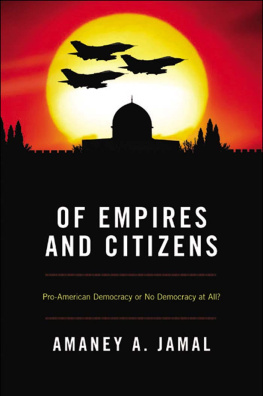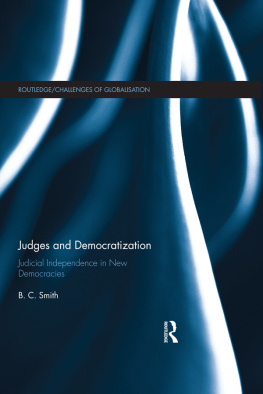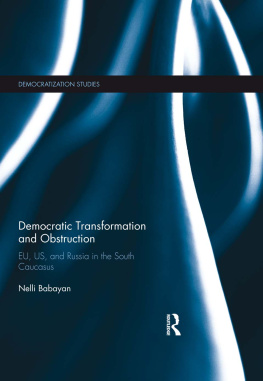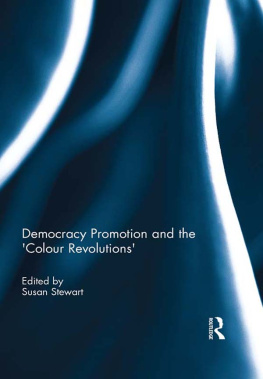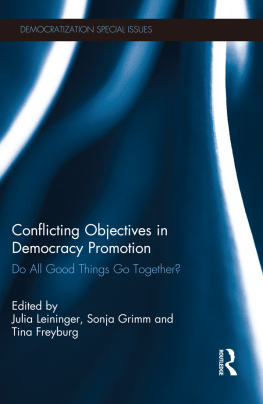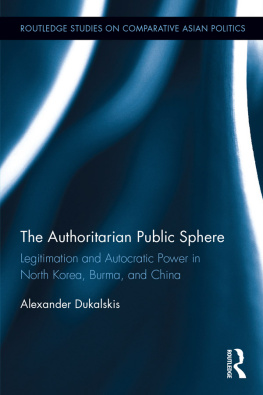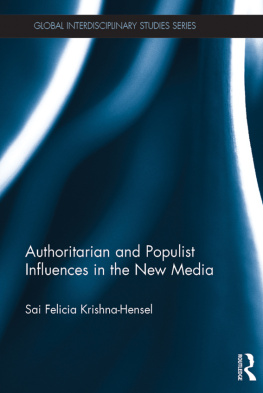Coloured Revolutions and Authoritarian Reactions
Between 2000 and 2005, colour revolutions swept away authoritarian and semi-authoritarian regimes in Serbia, Georgia, Kyrgyzstan and Ukraine. Yet, after these initial successes, attempts to replicate the strategies failed to produce regime change elsewhere in the region. The book argues that students of democratization and democracy promotion should study not only the successful colour revolutions, but also the colour revolution prevention strategies adopted by authoritarian elites. Based on a series of qualitative, countryfocused studies the book explores the whole spectrum of anti-democratization policies, adopted by autocratic rulers and demonstrates that authoritarian regimes studied democracy promotion techniques, used in various colour revolutions, and focused their prevention strategies on combatting these techniques.
The book proposes a new typology of authoritarian reactions to the challenge of democratization and argues that the specific mix of policies and rhetoric, adopted by each authoritarian regime, depended on the perceived intensity of threat to regime survival and the regimes perceived strength vis--vis the democratic opposition.
This book was published as a special issue of Democratization.
Evgeny Finkel is Assistant Professor of Political Science, George Washington University, USA. His articles have been published in Comparative Politics, Democratization, East European Politics and Societies, Global Society, Genocide Studies and Prevention, and several other journals.
Yitzhak M. Brudny is the Jay and Leonie Darwin Chair in Russian Studies, The Hebrew University of Jerusalem, Israel. He is the author of Reinventing Russia: Russian Nationalism and the Soviet State, 19531991 (Harvard University Press, 1998), and the principal editor of Restructuring Post-Communist Russia (Cambridge University Press, 2004). His articles on Russia and the former Soviet Union have appeared in numerous journals and edited volumes.
First published 2013
by Routledge
2 Park Square, Milton Park, Abingdon, Oxon, OX14 4RN
Simultaneously published in the USA and Canada
by Routledge
711 Third Avenue, New York, NY 10017
Routledge is an imprint of the Taylor & Francis Group, an informa business
2013 Taylor & Francis
This book is a reproduction of Democratization, vol. 19, issue 1. The Publisher requests to those authors who may be citing this book to state, also, the bibliographical details of the special issue on which the book was based.
All rights reserved. No part of this book may be reprinted or reproduced or utilised in any form or by any electronic, mechanical, or other means, now known or hereafter invented, including photocopying and recording, or in any information storage or retrieval system, without permission in writing from the publishers.
Trademark notice: Product or corporate names may be trademarks or registered trademarks, and are used only for identification and explanation without intent to infringe.
British Library Cataloguing in Publication Data
A catalogue record for this book is available from the British Library
ISBN13: 978-0-415-63957-6
Typeset in Times New Roman
by Taylor & Francis Books
Publishers Note
The publisher would like to make readers aware that the chapters in this book may be referred to as articles as they are identical to the articles published in the special issue. The publisher accepts responsibility for any inconsistencies that may have arisen in the course of preparing this volume for print.
Contents
Evgeny Finkel and Yitzhak M. Brudny
Evgeny Finkel and Yitzhak M. Brudny
Elena Korosteleva
Scott Radnitz
Jennifer Murtazashvili
Lawrence P. Markowitz
Gne Murat Tezcr
Yitzhak M. Brudny and Evgeny Finkel
The chapters in this book were originally published in Democratization, volume 19, issue 1 (February 2012). When citing this material, please use the original page numbering for each article, as follows:
Chapter 1
No more colour! Authoritarian regimes and colour revolutions in Eurasia
Evgeny Finkel and Yitzhak M. Brudny
Democratization, volume 19, issue 1 (February 2012) pp. 1-14
Chapter 2
Russia and the colour revolutions
Evgeny Finkel and Yitzhak M. Brudny
Democratization, volume 19, issue 1 (February 2012) pp. 15-36
Chapter 3
Questioning democracy promotion: Belarus response to the colour revolutions
Elena Korosteleva
Democratization, volume 19, issue 1 (February 2012) pp. 37-59
Chapter 4
Oil in the family: managing presidential succession in Azerbaijan
Scott Radnitz
Democratization, volume 19, issue 1 (February 2012) pp. 60-77
Chapter 5
Coloured by revolution: the political economy of autocratic stability in Uzbekistan
Jennifer Murtazashvili
Democratization, volume 19, issue 1 (February 2012) pp. 78-97
Chapter 6
Tajikistan: authoritarian reaction in a postwar state
Lawrence P. Markowitz
Democratization, volume 19, issue 1 (February 2012) pp. 98-119
Chapter 7
Democracy promotion, authoritarian resiliency, and political unrest in Iran
Gne Murat Tezcr
Democratization, volume 19, issue 1 (February 2012) pp. 120-140
Evgeny Finkela,b and Yitzhak M. Brudnyc
aDepartment of Political Science, University of Wisconsin-Madison, Madison, USA; bProgram on Order, Conflict, and Violence, Yale University, New Haven, USA; cDepartment of Political Science & Department of History, The Hebrew University of Jerusalem, Israel
Between 2000 and 2005, colour revolutions swept away authoritarian and semiauthoritarian regimes in Serbia, Georgia, Kyrgyzstan and Ukraine. Yet, after these initial successes, attempts to replicate strategies failed to produce regime change elsewhere in the region. This introductory article argues that students of democratization and democracy promotion should study not only the successful colour revolutions, but also the colour revolution prevention strategies adopted by authoritarian elites. The article proposes a new typology of authoritarian reactions to the challenge of democratization and presents the main findings of the special issue, devoted to the analysis of authoritarian reactions to colour revolution in the post-communist region and in Iran.
From 2000 to 2005, a series of popular protests, which later became known as colour revolutions, swept away authoritarian and semi-authoritarian regimes in Serbia, Georgia, Kyrgyzstan and Ukraine. The common trigger of these revolutions was an attempt by the authoritarian leaders to falsify election results in their favour. These revolutions established a repertoire of non-violent, sometimes successful, regime change strategies. In other Eurasian states, however, attempts to replicate key strategies, so successful in the earlier colour revolutions, such as peaceful protests, public demands for democratization, the use of election monitoring and post-election mass protests to contest fraudulent elections, failed. Moreover, in Eurasian countries where no serious attempt to launch a colour revolution was made, governments nonetheless chose to avoid the possibility of regime change by adopting policies often publicly described as anti-colour insurance. The elites of Russia, Belarus, Azerbaijan, Iran and several Central Asian authoritarian states sought to alleviate the threat of a colour revolution by focusing on several key political and intellectual strategies, namely attacks on independent civil society and political opposition, limits on electoral competition and efforts to ideologically delegitimize colour revolution ideas and techniques as subversive and alien to their countrys culture and traditions. In this special issue we argue that understanding authoritarian strategies of democracy prevention is therefore no less important than understanding strategies of democracy promotion.




